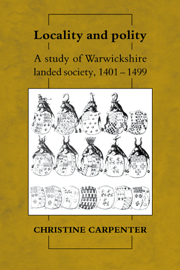Book contents
- Frontmatter
- Contents
- List of figures and tables
- Preface
- List of abbreviations
- Note on text
- 1 Introduction
- PART I STRUCTURAL
- 2 Geography, economy and regional identity
- 3 Who were the gentry?
- 4 Social mobility and the creation of estates
- 5 The exploitation of estates
- 6 Expenditure and dispersal
- 7 Conclusions: land, family and lineage
- 8 The local officers
- PART II CHRONOLOGICAL
- Appendices
- Bibliography
- Index
4 - Social mobility and the creation of estates
Published online by Cambridge University Press: 27 October 2009
- Frontmatter
- Contents
- List of figures and tables
- Preface
- List of abbreviations
- Note on text
- 1 Introduction
- PART I STRUCTURAL
- 2 Geography, economy and regional identity
- 3 Who were the gentry?
- 4 Social mobility and the creation of estates
- 5 The exploitation of estates
- 6 Expenditure and dispersal
- 7 Conclusions: land, family and lineage
- 8 The local officers
- PART II CHRONOLOGICAL
- Appendices
- Bibliography
- Index
Summary
The openness of the county elites of England to intruders from below has recently been questioned in a work which takes as its starting-point the year 1540. This date is itself significant in indicating the still lingering belief amongst some historians of early-modern England that English society before the Tudors was more rigidly stratified than it was subsequently to become. To a medievalist acquainted with the results of the Conquest, arguably persisting for a century or more, with the debate over the ‘crisis of the knightly class’ in the thirteenth century and with the steady stream of complaints about ‘upstarts’, foreign or otherwise, emitted by jaundiced contemporaries, this view has come to seem rather unreal. Indeed, the orthodoxy of the moment for English society between the Black Death and the end of the fifteenth century is identical with the one the Stones set out to investigate for a later age: an ‘age of ambition’, a time when the ranks of landowning society were peculiarly open to wealthy newcomers, to prosperous peasants grown rich on the misfortunes of their social superiors, to merchants and lawyers. Even those Tudor historians who stress the greater intensity of social mobility from the mid sixteenth century tend to find its first beginnings in this period. The issue is crucially important for a study of this kind. If the number of aspirants to gentility was growing, that could have a significant effect on competition for the adjuncts of gentility: royal office, noble protection and employment, and the marriage and land markets. If the society was unable to absorb social climbers there would be intensification of local conflict.
- Type
- Chapter
- Information
- Locality and PolityA Study of Warwickshire Landed Society, 1401–1499, pp. 96 - 152Publisher: Cambridge University PressPrint publication year: 1992



